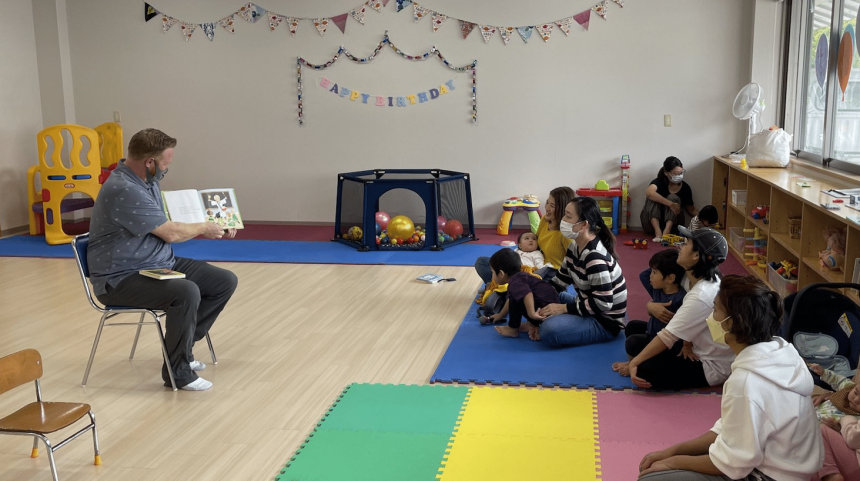Here in Okinawa, one of my regular duties within my job description for the U.S. Army is community relations. As anyone can imagine, community relations in Japan are quite different from community relations at my old job at the Seabee base.
One of our community relations partners, the Yomitan Family Support Center, hosts our unit for an annual storybook meet-up. Each month, personnel from my unit visit the center that caters to single mothers, new mothers, and financially unstable mothers. All sorts of socialization activities are planned for babies and toddlers. There are other classes offered like breastfeeding tutorials, diaper changing, sleep habits of babies, and many more helpful blocks of instruction. It really is a top-notch organization, and many of the moms have seemed to be very grateful when I go to read storybooks in English.

The purpose of reading the storybooks in English is to give infants and toddlers familiarity with English sounds, words, accents, etc. This activity is in no way designed to teach English or for any of the stories to actually be understood. Researchers have proven that hearing a foreign language spoken in that native tongue at early stages helps develop children’s ability or aptitude for that language later in life.
I’ve been to the family support center quite a few times since my first storybook reading, but I suspect none of them will be as memorable as my first encounter. My Japanese counterpart in the office made a few comments in Japanese and gave me the floor. I was nervous but happy to make my own introductions. In Japanese, I told the crowd of moms and babies my name and explained that I had just moved from Mississippi to Okinawa within the past couple of weeks.
There was a murmur on one side of the crowd of ladies. They were all whispering in Japanese and gesturing toward me. After I finished talking about myself, I was approached by a cute petite lady with a few-month-old baby who seemed to have already grown to half her size. She was the most vocal one of the group of ladies chatting in the corner of the room when I used the phrase “Shusshin Wa Mississippi Des,” meaning I am from Mississippi.
“Could you please hold my baby?” She said in heavily accented English as she thrust her baby skyward toward me. I took her baby from her, thinking that maybe she needed a restroom break or something. Instead of walking away to take care of other business, she stood there fixated on her baby and me. She asked me to hold him for several minutes and asked me to make skin-to-skin contact, which was starting to pique my curiosity.
Again, I am brand new to this island and to this culture. The last thing I wanted to do was to offend her. I figured that as long as she was requesting I hold her baby skin-to-skin in the safety of a crowded room, no harm could come of it.
After a few minutes, I started to feel grateful that she was asking me to hold her baby. I started to feel honored that she would trust a strange foreigner to hold her baby. The baby, however, screamed for his mother the entire time and squirmed to get free from my embrace. It was an odd moment for me, and the mom smiled from ear to ear to assure her baby that everything was all right. Eventually, it was time to give the baby back. The mother looked at me and touched my arm. “Thank you so much for this.” She said with a heartfelt smile and a short customary bow that is used as a sign of respect in lieu of a handshake or hug.
I told her that it was no problem. She repeated again, “Thank you for sharing your unique bacteria with my baby.”
I was dumbfounded and asked, “What?!?” She responded, “My family has never touched anyone from Mississippi before. I wanted my baby to absorb some of the human flora from a person that recently lived in Mississippi. It will make him stronger,” she explained.
I didn’t know what to say except a curt “You are welcome, ma’am.” After I made my exit from the event, I sat in my car and died laughing. I have never in my life been asked to share my particular brand of bacteria with anyone. I also know from my studies that the Japanese are not touchy-feely at all. So, this would be one of the rare times and stranger in Japan dared to touch my dirty “gaijin” (Japanese word for foreigner) skin.
There has only been one other time when a Japanese stranger overtly touched me. She was a young, drunk, and extremely pretty Japanese lady in Sapporo who ran up to me in the freezing cold and vigorously rubbed my bushy beard, and screamed, “Kuma-san!” which means Mr. Bear in English. She ran off into the crowded ice sculpture festival, and I never saw her again.
Later, I googled human flora, and no doubt it is a real part of microbiology. It turns out that flora is a term used for the aggregate of microorganisms found on the surface of human skin, in the intestinal tract, and in the mucus membranes.
I couldn’t help but think that the science might be a bit more nuanced than rubbing my skin on another person, but hey…who knows? It seems like this type of science might have been what killed off the native tribes when Columbus and Cortez explored the Americas. I prayed for weeks that this baby didn’t come down sick with some sort of American affliction. Thank God it hasn’t come to that. Last month, I saw the baby and he is doing great. I guess my Mississippi bacteria was pretty good after all.







